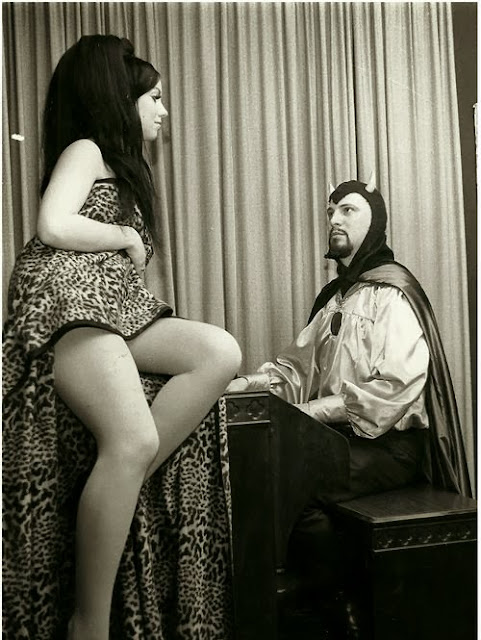And at the organ, Anton LaVey...The Strange Music 10-Inch (Armadillo Records,1994)
Here are the record's original back-cover notes:
Those who know only of Anton LaVey from hysterical Christian anti-Satanic tracts might be surprised that the devil's most outspoken advocate is actually a multi-talented musician, artist, writer, and collector of esoterica. LaVey has played a number of instruments professionally -- oboe, drums, theatre organ, calliope -- in venues ranging from the San Francisco Ballet Orchestra to carnival midways to the legendary El Rey Burlesque. He has been a long-time advocate for and collector of neglected, forgotten music and musical styles. Not only does he have a vast collection of oddball, exotic recordings, his own playing reflects an aggregate of circus, burlesque, martial, ethnic, novelty, vintage pop and classical genres too long ignored.
The selections on this album showcase Mr. LaVey's musicianship as he plays a battery of synthesizers, all of which he's programmed to duplicate acoustic instruments as closely as possible. There are no sequencers or multi-track overlays here -- just one track for music (often recorded in one take) and, in two songs, an added track for voice. The strength of LaVey's playing comes from his faithful reproduction not only of the sound of each individual instrument but of the style and phrasing characteristic of each, whether it's an accordion, an Hungarian concert cimbalom, a piano or a lonely late-night saxophone.
The first number on side one, "Thanks For the Memory", is long associated with Bob Hope, who introduced the song in his screen debut in Paramount's The Big Broadcast of 1938. Though it was usually Bing Crosby who did all the singing in their "Road..." pictures, two of the songs Hope introduced on his own -- this song and "Buttons and Bows" in The Paleface -- both became solid standard tunes, this one receiving an Academy Award. When Ralph Rainger (music) and Leo Robin (words) were told to write the song, they were told by the director that it was supposed to be a love song but not mention love directly, and that it was to be a serious song but, because Hope would be singing it, it had to have laughs too. When they finally put the song together, they were hesitatnt to present it to the director because they weren't sure it would be humorous. The lyrics deftly portrayed a sophisticated couple who were still in love but couldn't admit it, reflecting on their past together. They were right; everyone they played it for cried.
The second selection, "Strange Music", was written by Robert Wright and George Forrest. You might find the melody vaguely familiar; it's based on Edvard Grieg's "Wedding Day at Troldhaugen". Wright and Forrest included it in the 1944 operetta, Song of Norway, which was based on Grieg's life and music.
"Temptation", the concluding song on side one, has seldom been played straighter than in this hypnotic, bump-and-grind version. It's a song that many have known by title but have never heard; the archetypal burlesque exotic number. It's been around since Bing Crosby introduced it in 1933 in the MGM musical, Going Hollywood, with words by Arthur Freed and music by Nacio Herb Brown. Although vocalists have hit the top of the charts with "up" vesions of "Temptation", it has seldom been recorded in LaVey's driving burlycue style, which best seems to accentuate the song's exotic nature.
"Start the Day Right", which opens the second side, should be included on a play list of "Bugs Bunny's Hit Parade". It was written by Charles Tobias, Al Lewis and Maurice Spitalny and often sung by Connee Boswell, one of the original Boswell Sisters, who disbanded in 1936. Here, Blanche Barton does a distressingly optimistic rendition.
"One For My Baby (And One More For The Road)" has been lucky for many performers, and was one of Harold Arlen's favorites among the dozens of well-known songs he and lyricist Johnny Mercer had written. Introduced by Fred Astaire in 1943 in The Sky's the Limit, the song gained fame in the 1948 film noir, Road House, where it was sung by Ida Lupino. LaVey's arrangement captures the after-hours sleaze required.
"The Year of Jubilo", or "Kingdom Comin'", by Henry Clay Work, is an American Civil War number that has been neglected because of its references to "Darkies" and slavery. The politcally correct ban is unfortunate because not only is it a good tune in the style of "Dixie", but the lyrics are intended to make fun of the "Massa" who is hastily vacating the plantation ahead of the invading Northern troops. As with all the instruments on this album, the cornet and banjo, as realistic as they may sound, are played on synthesizers.
"Gloomy Sunday" is probably the world's champion suicide song, at one time banned from the radio in some 15 countries, found as mute evidence on the turntables of significant numbers of people who did away with themselves, using it to accompany their final exit. Fortunately, it has a history befitting its effect. It was originally an Hungarian instrumental number by Rezso Seress. Written in 1931, it finally gained English lyrics by Sam Lewis in 1936 and was recorded by Hal Kemp among others. It wasn't until five years later that Billie Holliday made it a best-selling hit, despite the ban. The man who wrote the lyrics was also the one who had written so many of the forced-upbeat Depression-era songs, like "I'm Sitting on Top of the World". Seress, the original composer, eventually killed himself, as did the woman he wrote the song for. This version, sung by Blanche Barton, incorporates original Transylvanian chording, played as a funeral dirge with a cimbalom interlude.
If you are interested in contacting Anton LaVey, or wish more information on his organization, please send a SASE to: Church of Satan, Post Office Box 210082, San Francisco, California 94121.








This comment has been removed by a blog administrator.
ReplyDelete